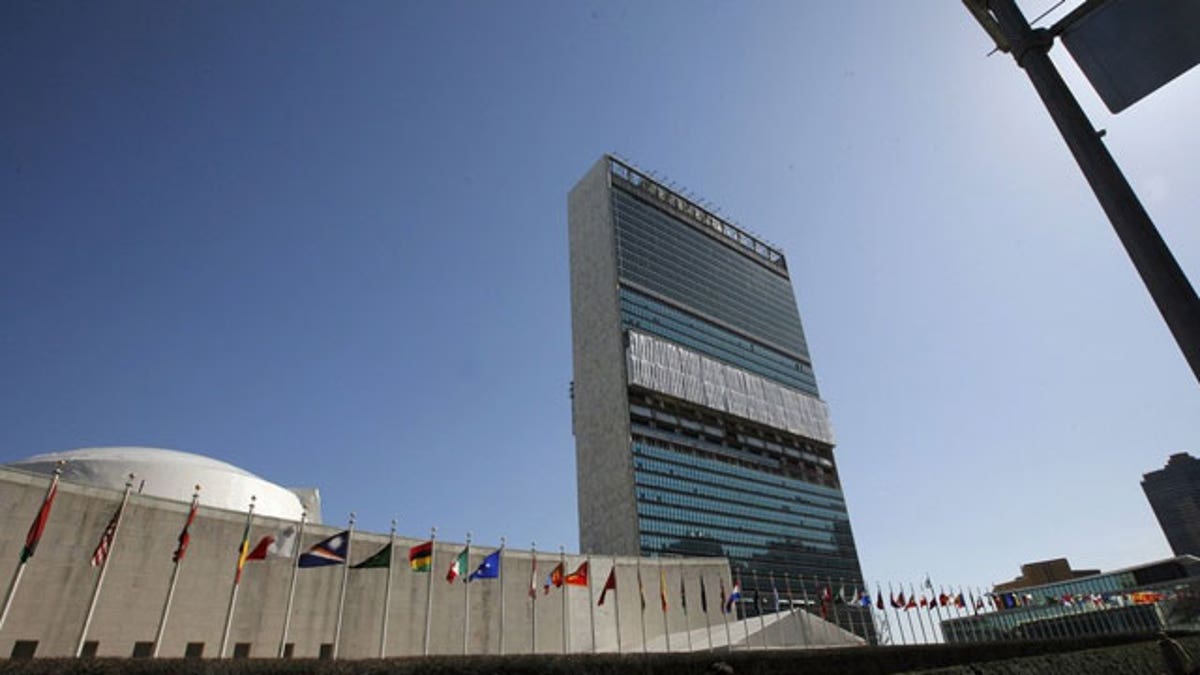
UNITED NATIONS – American Second Amendment rights and U.S. foreign policy interests could be directly threatened by the latest wording of a United Nations draft treaty seeking control over international trade in conventional weapons, FoxNews.com has learned.
[youtube yq0FnVNUrXI]
A U.S. delegate argued against the provisions during closed-door talks Friday, but insiders close to the proceedings say UN approval of a final document by the self-imposed July 27 deadline remains likely.
The development comes just days after Wayne LaPierre, executive vice president of the National Rifle Association, warned there should be “no compromise” on the issue of a U.S. citizen’s right to own a firearm.
“We will not stand idly by while international organizations, whether state-based or stateless, attempt to undermine the fundamental liberties that our men and women in uniform have fought so bravely to preserve – and on which our entire American system of government is based,” LaPierre told the UN Conference on the Arms Trade Treaty (ATT).
The latest draft bars weapons transfers to “non-state actors” – which, by definition, include private citizens.
[pullquote]
While treaty supporters say the provision speaks to a long-stated goal of denying weapons to terrorists, many experts warn of wider consequences.
“The ATT will not limit the ability of terrorists to acquire arms. The reason for this is simple: The UN has never defined terrorism, because some member states insist that terrorist groups like Hamas are struggling against so-called foreign occupation,” Ted Bromund, senior research fellow with the Washington-based Heritage Foundation’s Margaret Thatcher Center for Freedom, told the conference last week.
Implementation of the latest draft risks restricting U.S. foreign policy because it could limit Washington’s ability to sell arms to strategic allies such as Israel and Taiwan, one insider explained.
“It says states ‘shall not authorize’ arms transfers unless they take account of certain issues, but the U.S. took the view that [the criteria] was incompatible with the current U.S. export control system,” this insider explained.
Despite the U.S. objections, the source told FoxNews.com: “Momentum overall is still very strong for getting a treaty.” To meet the deadline, emergency sessions have been arranged for this weekend – even though translators may not be on hand.
The U.S. mission to the UN did not respond to a request for comment on the latest turns in the talks, which are taking place in New York.
UN resistance to exempting civilian arms from the treaty is linked to the fact that few of the world body’s 193 member states provide their citizens with a constitutional right to bear arms.
The U.S. opposition to arms transfer restrictions, meanwhile, marks a clear acknowledgement on the part of the Obama administration that the treaty, as it stands, risks straitjacketing U.S. foreign policy.
Indeed, such wording applied historically might have constrained the Reagan Doctrine, which allowed for giving overt and covert aid to anti-communist resistance movements during the ultimately successful Cold War confrontation against the Soviet Union.
In discussing other ways the draft treaty has evolved, the source close to the talks said there is now “some momentum” towards exempting ammunition from the treaty. This would meet a key U.S. and gun lobby demand. There may now also be no reporting requirements for small arms and light weapons sales.
But the U.S. Friday did not oppose the draft treaty’s call for proscription of arms transfers that “prolong international instability,” the source confided.
With the word “instability” serving as UN code for “war,” this provision could arguably help aggressors who strike first to hold onto their gains, some analysts will argue. That’s because states would not be able to help the losing side by arming it.
But the U.S. Friday did not oppose the draft treaty’s call for proscription of arms transfers that “prolong international instability,” the source confided.
With the word “instability” serving as UN code for “war,” this provision could arguably help aggressors to hold onto their gains, some analysts will argue. That’s because states would not be able to help the losing side by arming it.
Steven Edwards is a UN-Based freelance journalist. Follow him on Twitter: @stevenmedwards
